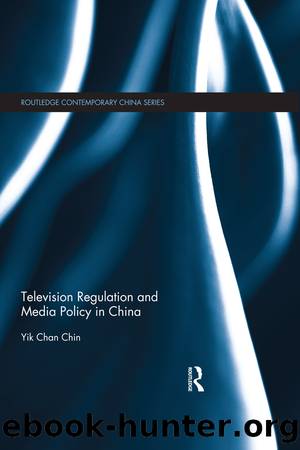Television Regulation and Media Policy in China by Yik Chan Chin

Author:Yik Chan Chin [Chin, Yik Chan]
Language: eng
Format: epub
Tags: Ethnic Studies, Social Science, Political Science, Regional Studies, General
ISBN: 9781135042059
Google: LTIlDwAAQBAJ
Goodreads: 31458128
Publisher: Routledge
Published: 2013-08-11T00:00:00+00:00
Public service policy: equalization, universal coverage and protection of cultural rights
The development of PSB is integrated with the nationwide construction of a cultural public service system. The notion of CPS first appeared in the CCPâs 2005 recommendation document submitted to the State Council (CCP, 2005a), and was officially adopted by the State Council in its 2006 Outline of Cultural Development during the Eleventh Five-Year Plan (CCP and State Council, 2006).
Cultural public service is intended by the Party to âenrich the peopleâs spiritual [and] cultural life and establish a harmonious society.â Launched to ease the inter-regional and urbanârural socio-economic development gaps, the social welfare system crisis, the lack of the rule of law, the deterioration of morality and trust, and corruption, the Harmonious Society aspires to âhuman-based individual comprehensive development,â âsocial justice,â âsharing of the fruits of reform by all people,â âformation of the rule of law and democracy,â and âthe correct management of the relationship between development and stability in order to maintain social unityâ (CCP, 2005a; CCP, 2006). The national construction of CPS is thus informed by the policy goals of social equalization â universal coverage and equal access â through public funding provision, and protection of the basic cultural rights and needs of the Chinese people, in particular low-income and other vulnerable groups (CCP, 2006; CCP, 2007; Wen, 2007). The Party-State defines cultural rights as rights to education, science and culture; and rights to enjoy the benefits of cultural life, take part in cultural activities, and carry on cultural creation (CCP Theoretical Bureau, 2008: 172). Basic cultural rights are rights of access to TV, radio, books and newspapers (CCP and State Council, 2006). Measures prioritizing cultural resource allocation to minority groups and rural areas and enhancing the âproduction and provision of public cultural productsâ have been introduced. Cultural public service is planned and funded by the government, and provided through public cultural institutions such as libraries, museums, and television and radio stations (CCP, 2007; CCP and State Council, 2006).
On the other hand, PSB policy rhetoric reveals little indication that the Chinese government is preparing to establish a PSB provider that is separate from the existing state-controlled media sector. Instead, PSB is viewed as a kind of separate media function whose performance can be demanded from existing broadcasters â a new range of service obligations mandated by the state. For example, broadcasters can be required to carry certain levels of news and current affairs programming intended to enlighten the citizenry, which can be represented as fulfillment of democratic imperatives within the media sector. Unlike museums and libraries, for which ownership can reside âamong the peopleâ (æ°é´, Minjian, privately), all news and current affairs-focused media, including Party newspapers and magazines, news agencies, radio and television stations, and important online news websites, are defined as important ideological âbattlefieldsâ and remain entirely state-owned. They are requested to enhance positive reporting on, and dissemination of CCP and state policies, and to report accurately on public opinion. The overarching view is of the media
Download
This site does not store any files on its server. We only index and link to content provided by other sites. Please contact the content providers to delete copyright contents if any and email us, we'll remove relevant links or contents immediately.
Spell It Out by David Crystal(35861)
Life for Me Ain't Been No Crystal Stair by Susan Sheehan(35550)
Cecilia; Or, Memoirs of an Heiress — Volume 1 by Fanny Burney(32093)
Cecilia; Or, Memoirs of an Heiress — Volume 3 by Fanny Burney(31481)
Cecilia; Or, Memoirs of an Heiress — Volume 2 by Fanny Burney(31435)
The Great Music City by Andrea Baker(30932)
Professional Troublemaker by Luvvie Ajayi Jones(29445)
We're Going to Need More Wine by Gabrielle Union(18664)
Twilight of the Idols With the Antichrist and Ecce Homo by Friedrich Nietzsche(18324)
The Secret History by Donna Tartt(18269)
All the Missing Girls by Megan Miranda(14858)
Cat's cradle by Kurt Vonnegut(14804)
Pimp by Iceberg Slim(13828)
Bombshells: Glamour Girls of a Lifetime by Sullivan Steve(13718)
Fifty Shades Freed by E L James(12937)
Talking to Strangers by Malcolm Gladwell(12916)
Norse Mythology by Gaiman Neil(12880)
The Social Justice Warrior Handbook by Lisa De Pasquale(11969)
Underground: A Human History of the Worlds Beneath Our Feet by Will Hunt(11857)
